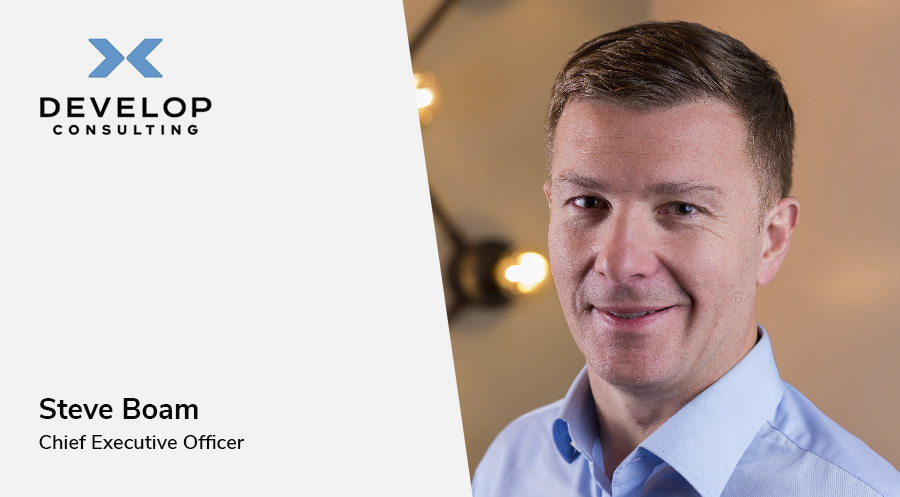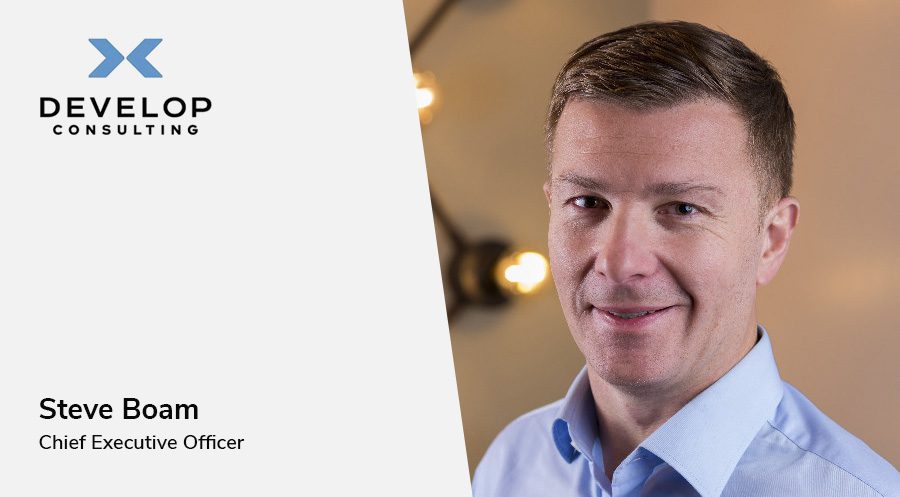The past four years have seen firms across the UK and Europe respond to unprecedented change – while having to balance their finances – something which has seen the Lean experts at Develop Consulting come in for heavy demand. Founder and CEO Steve Boam spoke to Consultancy.uk about how his firm is helping clients maximise their productivity, and how it has built Lean principles into a new platform for workplace education.
After a career with the UK and Japan branches of Toyota, Steve Boam moved into the advisory realm in 2001. Having been headhunted due to his time in the automotive sector, Boam’s first professional services role came as a Senior Lean Specialist with RWD Consulting. In 2004, he decided to found his own Lean and Six Sigma firm – KM&T – which grew to 150 consultants globally, with offices across North America, Europe and the APAC region.
After a successful period of business, 2018 saw Boam exit the £12 million-turnover company, amid a management buyout. It was then that he decided to put what he learned from the experience into the founding of a new entity: Develop Consulting.

“Rather than working globally, primarily we’ve just focused on the UK and Europe over the last four years,” Boam – who is also CEO of Develop – recalled. “We’re very proud of the engagements we’ve had in those markets. For example, one of our stand-out engagements was for a UK boat builder. In a very traditional industry, the focus had been on ‘craftsmanship’, rather than being manufacturing-led, and we completely changed that – so their factories became production factories. Demand had been greater than capacity, but we helped them integrate Lean manufacturing principles, and with those best practices they cut their 20-day building cycle, to a five-day cycle, with 50% less people. That’s a huge business case for what we do.”
Originally developed by Toyota in the 1950s, Lean refers to any method, measure, or tool that helps in the identification and elimination of waste. Meanwhile, the term Six Sigma refers to tools and techniques that are used to improve manufacturing processes. While these methodologies have been particularly popular among manufacturing, they also have applications in other industries – and according to Boam, Develop and its leaders are ideally positioned to help translate them to clients across the industrial spectrum.
“In our old business, we started out as a manufacturing consultancy, focusing on clients in the segment, but in 2006, we heard the NHS was looking at Lean, and considering emulating the Toyota process in particular. That’s how we first shifted into also catering to the health sector… When we launched Develop, we knew the potential to help healthcare clients to work Lean was there, so we’ve always done it. Now, the split of our work between healthcare and manufacturing is about 50:50.”
In the healthcare realm, the firm works with hospitals, General Practitioners (Develop has worked with roughly a third of the UK’s 6,000 GPs), and on one national programme for NHS England contract. The firm was awarded a contract in 2022, to support the implementation of efficiency improvements via the Productive General Practice Quick Start project – part of NHS England’s ‘Time for Care’ programme, aiming to help hospitals to improve their quality care and work processes.
Considering the pros and cons of the UK’s celebrated health service, Boam said, “When you look at the international stats, the NHS in the UK is one of the best in the world. When you need it, the care is top-tier. But it is also one of the most costly healthcare systems in the world. When you look at other indicators like productivity and efficiency, it is low – so when you need it the care is great, but it has grown and grown, and we see this in industry, businesses evolve and lose focus on what they started to do or what the customer wants.”
From his original background with Toyota, Boam is clear on why healthcare providers have started to look to the manufacturer for inspiration. Toyota “might not make the most exciting cars,” but the firm has always been clear that it prioritises giving customers what they want; value for money, “cars that will run almost forever.” The model to produce that is something Develop still points clients to.
“Sometimes we have taken – and still take – doctors to car factories, and they don’t understand first – but in the end, they get that it’s not all about the car,” Boam recalled. “It’s about the people, the teamwork, the management systems and processes. Toyota pride themselves on two things; people and process. It’s about the process we put the patient through. How does that flow? And once you examine that, usually you find there’s lots of points of waste you never even considered. We help show healthcare providers where those are.”
Lean times
At the same time, Develop is still finding new areas to branch into within the manufacturing sector. Having been active within the automotive, rail, and marine segments, the firm is also taking on more ‘modular’ manufacturing engagements, as they become more popular in the UK particularly.
Boam noted, “Modular construction involves producing standardised components of a structure in an off-site factory, then assembling them on-site. Modular housing has been big in Europe for years, but modular housing is becoming a bigger thing in Britain over the last two or three years. So more and more, we’ve been helping modular factories, to design a factory or to reestablish the current factory on modular principles.”
Finding areas where processes can be made more efficient can help firms do the same – or more – with less. As such, Lean modes of operation could be the answers to the great questions that many business owners are currently facing. For instance, labour shortages are at the top of every board’s agenda at present – but ramping up hiring efforts might not be the only way to solve that.
Boam expanded, “All the industries we work with, in manufacturing or healthcare for that matter, they’re all telling us that they’re having difficulty recruiting. Brexit is a big part of that, because it is now more difficult to get European workers into the country due to visa requirements and so on. But if you’re really struggling with a skills shortage, rather than pouring more resources into hiring, or spending lots of time developing your people, getting your people extra skills – you could also de-skill some of the work.”
Looking back to modular building, Boam suggested that building a normal house would require a skilled electrician to install cables in its walls. However, in a modular setting that is not necessarily, as the walls have been manufactured ready-made for cables to be inserted. In this case, “anyone can pull cables through a hole and cut the cables” – de-skilling the job, making it less difficult to recruit for. Similarly, car factories do not deploy trained electricians to wire every vehicle – all that is necessary is “someone who’s been trained to be a general operator.”
Building capacity
This is not something which is possible, or even disirable, for every facet of work, though. To that end, firms still need help building skills and capacity when it comes to implementing long-term change. To that end, Develop is augmenting its offering, after being asked by many clients for one new service in particular.
“CEOs only employ consultants for three reasons in our experience,” Boam stated. “First, they may not have any idea what they need to do, and need outside advice on that. They sometimes may know what they want to do, but have no capacity to do it – so we provide extra skills as and when they are needed. Or they know what to do, and have a team they think can do it, but need to coach their ability.”
“Some businesses have previously said to me, ‘why would we hire an expensive consultant to train staff when we can do that inhouse?’ I always tell them that that is indeed an option. You could do that, but it could take you 12 to 18 months, and in that time, whoever is doing the training usually has their own role to take care of on top of that. Ideally, then, you want a catalyst to help you do that, without seeing other aspects of the business suffer. That’s why we set up the training company, because clients were starting to see that – and asking us to do training.”
While some clients want this as part of Develop’s service offering, however, others do not even “have the time” to commit employees toward intensive, conventional courses. Physical attendance takes staff away from executing the everyday tasks that keep companies running – so to help clients supply staff with new skills outside of working hours, Develop has also unfurled a new online training firm, called click2 learn.
Lean principles are at the heart of click2 learn, which can be accessed “any time, any place, from any device” according to Boam. The online resource was designed from scratch, and breaks new processes and the introduction of Lean methodology into bite-sized chunks, which means “in their own time: on the train to work, on a Saturday morning, or over a coffee at break time”, staff can “learn the leadership skills they need for their job”.
Looking ahead
When it comes to the future, many consulting leaders like to talk a big game – suggesting they are shooting for the moon, and listing grand aspirations for revenue and headcount growth. Befitting a business leader who has devoted his career to Lean principles, however, Boam is more measured as to what the future holds for Develop.
“We want to grow Develop, of course, but modestly,” he confirmed. “We don’t want to say we’ll double the size of the firm in the next six months – because we wouldn’t be able to get the resources to manage that growth. We don’t want double-digit growth, we’ve been there in the past. We’re just looking for steady growth, and to use some of the learning, some of the skills, some of the investment from Develop to do interesting things.”
Among the things this might entail, Boam pointed to the training business, as well as suggesting Develop was working on “some products for healthcare” – some of which are “akin to consulting” while others are more “in the digital space”. Overall, though, the aim is to build up a “portfolio of Develop companies” for long-term success.
Expanding on what that might look like for the firm’s healthcare line in particular, Boam concluded, “We are looking to expand a programme leveraging Toyota’s Lean principles across all the UK’s 6,000 GPs in the coming years. But we are also looking at other things we can develop to help the health sector – from diagnostic tools, to quality tools, to standardised and better ways of doing things. Then, linking back to the training, there’s a huge market to train people in the sector, get them up to speed with Lean techniques, Agile techniques too, because that’s still quite alien to the healthcare sector.”




